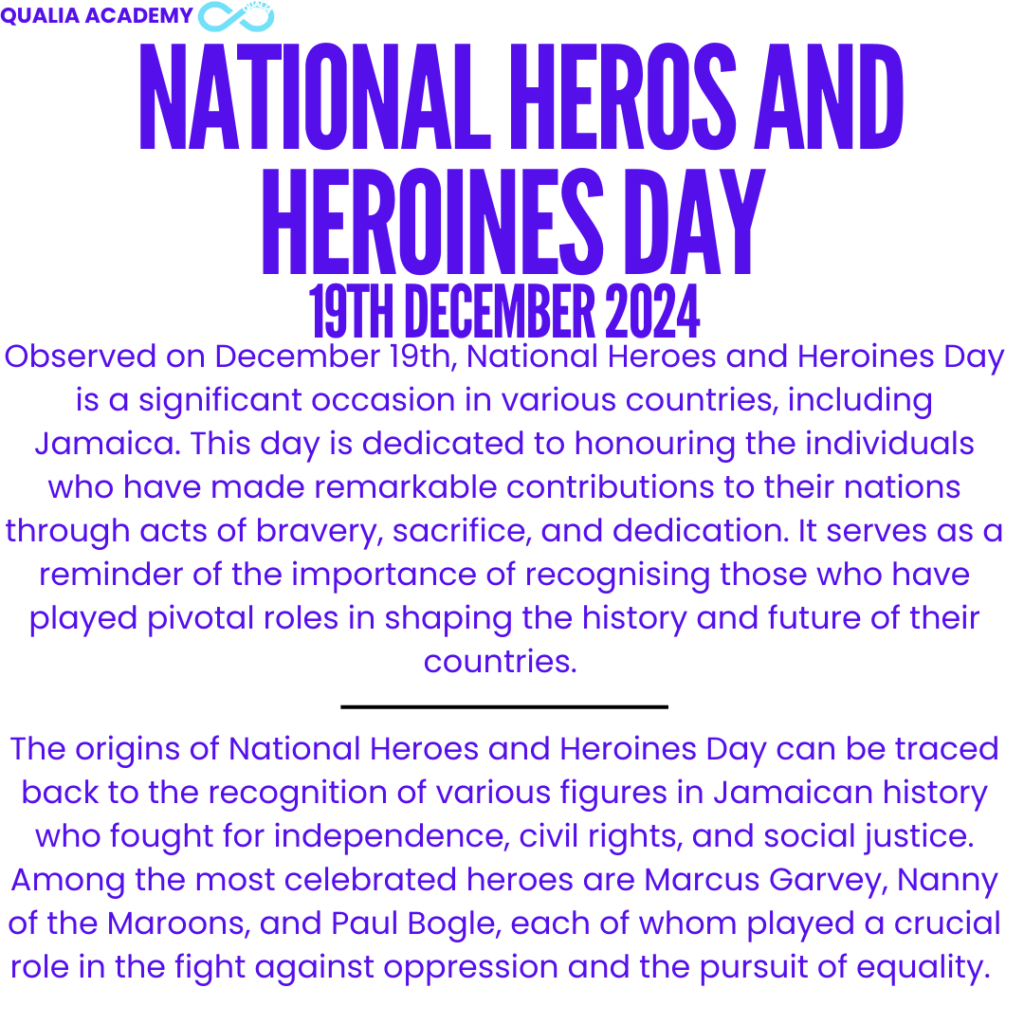December presents a rich tapestry of commemorative days that invite reflection, unity, and remembrance. Among these are the Day of Reconciliation on December 16th, Blue Christmas on December 17th, and National Heroes and Heroines Day on December 19th. Each of these days holds significant cultural and emotional weight, encouraging communities to come together and reflect on their shared histories, values, and aspirations.
Day of Reconciliation
The Day of Reconciliation, observed on December 16th, is a pivotal occasion in South Africa. It serves as a reminder of the nation’s tumultuous past, particularly during the apartheid era, and is a call for healing and unity among its diverse populations. This day was officially established in 1994, the year when South Africa transitioned to a democratic state, marking the end of decades of institutionalised racial segregation.

Significance of the Day
The significance of this day lies in its dual historical meaning. December 16th is noteworthy not only for its association with the struggle against apartheid but also for its earlier significance in the history of the Afrikaner people. It was originally commemorated as the Day of the Vow, which celebrated the victory of Afrikaners at the Battle of Blood River in 1838. However, post-apartheid, the day has been reimagined as a day of reconciliation, reflection, and nation-building.
Celebratory Activities
Communities across South Africa engage in various activities to commemorate the Day of Reconciliation. These include interfaith services, community dialogues, and cultural events that promote unity and understanding among different racial and ethnic groups. Schools often hold educational programmes to teach students about the importance of reconciliation and forgiveness.
Government officials and community leaders typically address the nation, urging citizens to embrace their differences and work towards a future built on mutual respect and cooperation. The day also provides an opportunity for individuals to reflect on their personal experiences of reconciliation and the collective journey towards healing.
Ways to Promote Reconciliation
Promoting reconciliation requires conscious effort from individuals and communities alike. Here are some meaningful ways to engage in the reconciliation process on this significant day:
Community Dialogues:
Facilitate conversations among community members about past grievances and present challenges. Creating safe spaces for open dialogue can help individuals share their experiences and foster understanding.
Educational Workshops:
Organise workshops in schools and community centres that focus on the history of apartheid and its impact on South African society. By educating the younger generation, we ensure that the lessons of the past are not forgotten.
Cultural Exchanges:
Host events that celebrate the diverse cultures within South Africa. These could include music, dance, and art exhibitions that highlight the richness of different cultural traditions and promote mutual respect.
Acts of Kindness:
Encourage individuals to perform acts of kindness within their communities, whether through volunteering, helping a neighbour, or supporting local charities. Such actions can build bridges and foster a sense of community spirit.
Reflection and Remembrance:
Encourage people to reflect on their personal journeys of reconciliation, perhaps through journaling or sharing their stories with others. This process of introspection can lead to healing and a deeper understanding of oneself and others.
Interfaith Services:
Organise interfaith gatherings where people of different religious backgrounds can come together to pray for peace, healing, and unity. These services can serve as a powerful reminder of our shared humanity.
Support Local Initiatives:
Engage with organisations that work towards reconciliation and social justice. Supporting their initiatives through donations or volunteering can significantly contribute to the ongoing efforts in healing the nation.
The Path to Unity
In recent years, the Day of Reconciliation has become a platform for discussing ongoing social challenges in South Africa, including economic inequality, crime, and xenophobia. It reminds citizens that the journey towards true reconciliation is ongoing and requires collective effort. As individuals and communities come together on this day, they are encouraged to engage in honest conversations about their experiences and aspirations, fostering a spirit of collaboration and understanding that is essential for nation-building.
Blue Christmas – 17th December
While many associate December with joyous celebrations and festive cheer, Blue Christmas, observed on December 17th, highlights a different reality for some individuals. This day is dedicated to acknowledging the struggles faced by those who are grieving, lonely, or facing challenges during the holiday season. The term “blue” in this context represents sadness and melancholy, often stemming from loss, separation, or emotional distress.
The Emotional Weight of the Season
For many, Christmas is a time filled with joy, family gatherings, and festive celebrations. However, for those who have lost loved ones or are experiencing significant life changes, this season can be particularly challenging. Blue Christmas serves as a poignant reminder that not everyone experiences the holidays in the same way.
On this day, individuals are encouraged to express their feelings and seek support from friends, family, or community resources. It is a time for acknowledging the pain and sadness that can accompany this season, promoting a sense of understanding and compassion for those who may be struggling.
Ways to Celebrate Blue Christmas
To observe Blue Christmas, individuals and communities can engage in various activities that honour the experiences of those feeling isolated or bereaved during the festive season. Here are some ways to celebrate this meaningful day:
Candlelight Vigils:
Organise candlelight vigils to honour the memories of lost loved ones. These gatherings can provide a space for people to reflect, share stories, and support one another in their grief.
Support Groups:
Create or participate in support groups specifically for those experiencing loss or loneliness during the holidays. These groups can provide a safe environment for individuals to share their feelings and seek comfort from others who understand.
Memorial Services:
Host memorial services in local churches or community centres where individuals can remember and celebrate the lives of those they have lost. Incorporating music, poetry, and personal testimonies can create a heartfelt and supportive atmosphere.
Art and Creativity:
Encourage individuals to express their emotions through art, writing, or music. Workshops that focus on creative expression can help participants process their feelings while providing an outlet for their grief.
Community Outreach:
Engage in community outreach efforts by providing meals, gifts, or companionship to those who may be alone during the holiday season. Acts of kindness can make a significant difference in someone’s life.
Quiet Reflection:
Encourage individuals to take time for quiet reflection and self-care. This might involve meditative practices, journaling, or simply spending time in nature to reconnect with oneself.
Share Stories:
Host gatherings where individuals can share their personal stories of loss or hardship. These sessions can help create bonds of understanding and empathy, reinforcing the idea that no one is alone in their struggles.
Mindfulness Activities:
Organise mindfulness sessions, such as yoga or meditation, focusing on grounding techniques that help individuals cope with overwhelming emotions. These activities can promote inner peace and emotional well-being.
Moving Forward with Hope
While Blue Christmas highlights the difficulties faced by many during the festive season, it also offers a message of hope and resilience. By acknowledging and validating feelings of sadness, individuals can begin to find ways to heal and move forward. This day encourages people to take care of their mental health and reach out for support when needed, reminding us all that it’s okay to not feel festive all the time.
National Heroes and Heroines Day – 19th December
Observed on December 19th, National Heroes and Heroines Day is a significant occasion in various countries, including Jamaica. This day is dedicated to honouring the individuals who have made remarkable contributions to their nations through acts of bravery, sacrifice, and dedication. It serves as a reminder of the importance of recognising those who have played pivotal roles in shaping the history and future of their countries.

Historical Background
The origins of National Heroes and Heroines Day can be traced back to the recognition of various figures in Jamaican history who fought for independence, civil rights, and social justice. Among the most celebrated heroes are Marcus Garvey, Nanny of the Maroons, and Paul Bogle, each of whom played a crucial role in the fight against oppression and the pursuit of equality.
The day is often marked by ceremonies, parades, and educational programmes that highlight the achievements of these heroes and heroines. Schools frequently engage students in discussions about the contributions of these figures, helping to instil a sense of pride and patriotism.
Ways to Celebrate National Heroes and Heroines Day
Celebrating National Heroes and Heroines Day is an opportunity to reflect on the sacrifices made by those who fought for justice and freedom. Here are some meaningful ways to honour this important day:
Wreath-Laying Ceremonies:
Organise wreath-laying ceremonies at monuments dedicated to national heroes and heroines. These ceremonies can be attended by community members, local leaders, and students, fostering a sense of collective remembrance.
Educational Workshops:
Facilitate educational workshops in schools and community centres that explore the lives and contributions of national heroes. Engaging students in discussions and activities can help them understand the importance of these figures in their nation’s history.
Parades and Festivals:
Host parades or festivals that celebrate national pride, featuring local artists, musicians, and performers. These events can highlight cultural heritage and the contributions of national heroes through art, music, and dance.
Community Projects:
Encourage communities to engage in service projects that reflect the values of their heroes, such as community clean-ups, charity drives, or educational initiatives. This is a way to honour their legacy through active citizenship.
Cultural Exhibitions:
Organise cultural exhibitions that showcase the achievements of national heroes and heroines. These exhibitions could include artwork, photography, and historical documents that tell the story of their contributions.
Public Speeches and Debates:
Host public speeches or debates on topics related to the values embodied by national heroes, such as justice, equality, and civic responsibility. This can inspire critical thinking and engagement among community members.
Storytelling Sessions:
Facilitate storytelling sessions where elders in the community can share their experiences related to national heroes. Oral histories can enrich the understanding of the struggles and triumphs of these figures.
Artistic Tributes:
Encourage local artists to create works that pay tribute to national heroes and heroines, whether through murals, sculptures, or performances. Such artistic expressions can inspire and educate the community.
Inspiring Future Generations
National Heroes and Heroines Day serves not only to honour the past but also to inspire future generations. By learning about the sacrifices made by these individuals, young people are encouraged to reflect on their roles as active citizens and contributors to society. The day prompts discussions about the importance of standing up for justice, equality, and human rights in contemporary society.
This celebration of heroism encourages individuals to embody the values of their forebears, fostering a spirit of community engagement and activism. As the nation comes together to celebrate its heroes, there is a collective aspiration to carry forward their legacies and continue the work towards a more just and equitable society.
Moving Forwards
December offers a wealth of opportunities for reflection, remembrance, and celebration. The Day of Reconciliation, Blue Christmas, and National Heroes and Heroines Day each serve as important reminders of the complexities of the human experience. While these days highlight different aspects of society—from healing and unity to grief and remembrance—they all encourage a deeper understanding of our shared histories and the importance of compassion, courage, and resilience.
As individuals and communities observe these days, they are reminded of the power of coming together, whether to heal from past wounds, support one another through difficult times, or celebrate the achievements of those who have paved the way for a brighter future. In a world that often feels divided, these commemorative days offer a chance to foster understanding and solidarity, creating a more harmonious and compassionate society for all.









